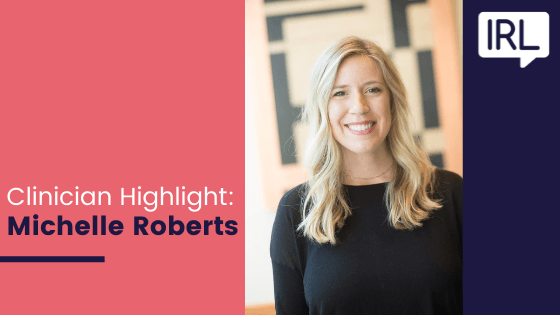Like some of the other therapists in our clinician highlight series, our voice specialist Michelle Roberts discovered her purpose which brought her to speech IRL in a roundabout way. She has been working as a professional voice specialist for 3 years, and the unique strength she brings to our practice is gender affirming voice therapy for transgender and gender nonconforming individuals. She also works with an ear, nose and throat doctor (ENT) to help actors and singers with various vocal issues.
Michelle’s passion has always been self-expression; she was the theater kid who rounded up her friends to put on plays that she wrote, and she continued on that track through college. She earned a bachelor’s degree in theater and drama and got the idea to go back to graduate school to become a voice specialist from an acquaintance who happened to be a speech-language pathologist. Studying voice combined Michelle’s passions for self-expression, communication and the scientific aspects of cognition. She realized her dream of working with singers and performers, but along the way, she found a deeper sense of purpose in helping transgender and nonbinary individuals develop a voice that’s congruent with their identity.
“The best part of what I do is watching that journey of someone grow into themself and to live authentically for the first time in their lives.”
Since certain vocal characteristics are perceived as being masculine or feminine, transitioning to a different gender identity can come with a lot of self-consciousness, which limits many transgender individuals from living fully as themselves. The thing most clients are concerned with at first is having a pitch that’s too high or too low, but pitch is just one component of a voice. Michelle explains that there are a few more elements to our internal “sound mixer” that can be tweaked to sound more masculine or feminine: these include resonance (where voice is placed in the vocal tract), intonation and pitch patterns, language differences and nonverbal communication. She begins by educating her clients about these aspects of speech and helping them become aware of what the extremes are for each. The goal is to empower them to experiment in a way that won’t damage their voices so they can find a place on the spectrum that feels natural.
The work Michelle does in the clinic often crosses over into both professional and personal areas of her clients’ lives. For example, one client started coming in right at the beginning of her transition to a female identity. She felt that the company culture at her workplace was limiting, which kept her from moving her career forward, and so Michelle helped her prepare for job interviews. This client is also a musician. After working with Michelle and hearing her own voice during a recording session, she commented that “I felt like I was hearing myself for the first time. That was the first time I had ever heard a recording of myself...that I actually identified with the voice I was hearing.” The client now works on air in journalism and loves the voice she has developed. She is able to go into interviews and important meetings with an awareness of what her voice sounds like without letting it take over her concentration.
Michelle’s niche training, experience and allyship with the LGBTQ community all make her a valuable member of our team. In her day to day sessions, she enjoys helping clients practice basic conversation skills they can carry into every part of their lives. Those who know her learn quickly Michelle always stands up for what she believes in and for others. She’s hoping to start a conversation group soon and do more advocacy work for the gender diverse community, especially in healthcare. In general, Michelle wishes more people understood how specialized and multifaceted an SLP’s work can be. Speech therapy isn’t just for kids!
In her own free time, Michelle has been taking French classes and is about 70% fluent. She hopes to become fully fluent and live abroad in France for at least a year. And last, Michelle is always dabbling in the arts. She’s on the lookout for a new creative outlet and thinking about taking up guitar, piano or both!
Learn more about gendered communication here or contact us to schedule a free consultation!

